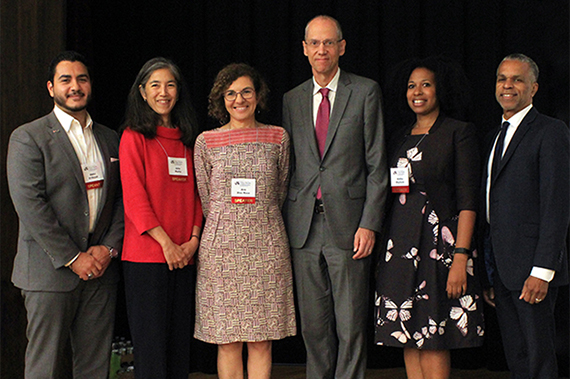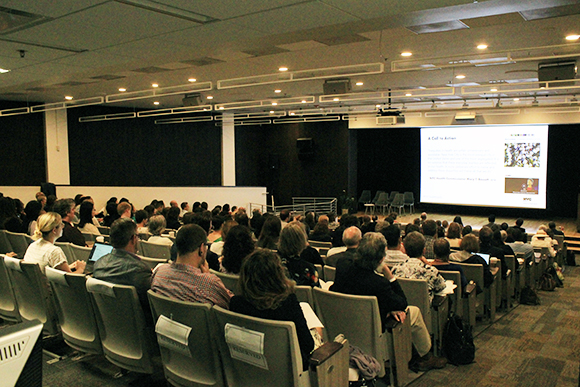Second Urban Health Symposium highlights global, local opportunities for improving health in cities
 Health Leaders: L-R: Abdul El-Sayed, MD, DPhil; Julie Morita, MD; Dean Ana Diez Roux, MD, PhD, MPH; Thomas Farley, MD, MPH; Aletha Maybank, MD, MPH; and moderator John Rich, MD, MPH.
Health Leaders: L-R: Abdul El-Sayed, MD, DPhil; Julie Morita, MD; Dean Ana Diez Roux, MD, PhD, MPH; Thomas Farley, MD, MPH; Aletha Maybank, MD, MPH; and moderator John Rich, MD, MPH.
September 20, 2017
With urbanization on the rise, researchers, policymakers and public health practitioners are faced with finding solutions to address public health challenges in cities. The Urban Health Symposium, hosted by the Drexel Urban Health Collaborative, was convened to get these groups talking, sharing knowledge and capitalizing on urban policies and experiments that work.
Speakers at the second Urban Health Symposium, “Reimagining Health in Cities: From Local to Global,” hosted on Sept. 7 and 8, 2017 at the Dornsife School of Public Health, provided perspectives on the challenges of urban growth locally in their cities and at the global scale. As Dornsife Dean Ana Diez Roux noted to attendees, the “local to global” theme is important.
“Cities can learn from each other,” Diez Roux said. “They have so many things in common in terms of the challenges they’re facing in urban health. Even from looking at specific situations, we can find some generalizable nuggets of knowledge.”
The Symposium featured two jam-packed days of inspiring speakers and global networking opportunities, and drew around 300 researchers, practitioners and policymakers from a variety of organizations and educational institutions.
Sharing Knowledge: Perspectives from U.S. and Global Urban Health Leaders
Philadelphia Health Commissioner Thomas Farley, MD, MPH, and Chicago Public Health Commissioner Julie Morita, MD, spoke on opportunities and approaches used to address health-related issues in their respective cities. NYC Department of Health Deputy Commissioner Aletha Maybank, MD, MPH, and former Detroit Health Commissioner Abdul El-Sayed, MD, MPH, spoke on health equity and touched on the role of race in health. Dr. Maybank shared how the NYC Department of Health underwent organizational and structural changes in a commitment to advancing health equity, saying “Equity is not a natural process. The pursuit of equity is extremely intentional, extremely direct and extremely courageous.”
On the global level, speakers discussed patterns of disease in their own countries, changing infrastructure and how to harness population changes for health.
University of Sydney Professor Anthony Capon, BMedSci, MBBS, PhD, FAFPHM, noted that, “The things we do collectively, the fuels we’re burning, what we manufacture, how we farm … the things we do as individuals, our lifestyles, how we move … and what we call ‘artifacts’ in ecology, the things we make, the buildings, roads… all effect the broader bio-physical environment, both its physical elements and its living elements. We can intervene at the global scale, but we can also drill down to this at the urban and neighborhood scale.”
The first day of the event was rounded out by speakers sharing novel uses of data in urban health research and sharing lessons on urban health policies and experiments that worked. American University assistant professor Michael Bader, PhD, shared information on the Computer Assisted Neighborhood Visual Assessment System or CANVAS, a software platform designed for researchers to reduce measurement error and encourage standard data collection protocols with limited technical expertise.
 Audience listening to a presentation by Aletha Maybank, MD, MPH, Deputy Commissioner, NYC Department of Health and Mental Hygiene
Audience listening to a presentation by Aletha Maybank, MD, MPH, Deputy Commissioner, NYC Department of Health and Mental Hygiene
Later in the afternoon, Hannah Lawman, PhD, director of research and evaluation with the Philadelphia Department of Health, shared policy “wins” gained by Get Healthy Philly, highlighting the city’s sugary beverage tax.
In 2010 and 2011, Philadelphia’s proposal for a sugary beverage tax based on health arguments failed to pass; however, in 2016 City Council approved a beverage tax measure, by emphasizing revenue would support pre-kindergarten education and a community schools program in the city’s public schools, rather than focusing on the potential health benefits of the measure.
“Our role is to help to evaluate this and see what is the impact of this historic legislation, both on health as well as on other potential outcomes,” Lawman said. “We want to know what happens to price and pass-through, but we also want to know what happens to consumption. And lastly, we want to know what is the experience with retailers. We’ve got some qualitative and quantitative methods to answer these questions.”
Promoting a Culture of Health in Communities
Mindy Fullilove, MD, professor at the Parsons School of Design, The New School, was the keynote speaker on the second day of the Urban Health Symposium, sharing her experience and insights on how to create and promote a culture of health.
Fullilove lamented the silos that public health practitioners have often found themselves working within, noting that “little, siloed programs were of such a tiny insignificant scale” compared to issues community members faced each day. She challenged Symposium attendees to think at a larger scale, asking “how do you think big enough so that you’re actually working at the size of their problems” when addressing community health issues.
The challenge, as Fullilove noted, is that many believe that health is healthcare — but it’s not simplistic.
“What people have figured out is that health is about 20 percent of clinical care, access to care and quality of care. It’s not the whole thing,” Fullilove said. “You need education, employment, income community safety, air and water quality, housing… you need all of this to have a healthy population.”
The remaining sessions held on the second day of the Symposium highlighted the challenge of gentrification and segregation, as well as the need for community partnerships to translate scientific evidence into real action. Bob Gradeck, MCP, project manager at the Western Pennsylvania regional Data Center at the University of Pittsburgh told the audience “using data to drive our actions, we can actually make an impact.”
In addition to the two-days of insightful sessions, the Symposium also featured over 60 posters, covering a broad range of research topics related to urban health. Selected posters were displayed for five categories: novel urban health research methods; built environment and climate change; health disparities and special populations; program and policies to improve health in cities; and addressing urban challenges, health behaviors and mental health.
The next Urban Health Symposium will be held in 2019. For updates on future events and research from the Drexel Urban Health Collaborative, visit drexel.edu/uhc.